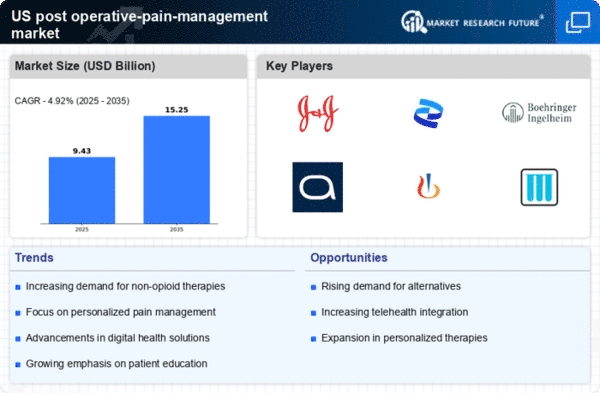Increasing Surgical Procedures
The post operative-pain-management market is experiencing growth due to the rising number of surgical procedures performed annually in the US. As healthcare technology advances, more patients are opting for surgical interventions, which in turn increases the demand for effective pain management solutions. According to recent data, the number of surgeries has increased by approximately 10% over the past five years, leading to a corresponding rise in the need for post operative pain management. This trend suggests that healthcare providers are increasingly focused on improving patient outcomes through effective pain control strategies, thereby driving the post operative-pain-management market. Furthermore, the emphasis on patient satisfaction and recovery times has led to the adoption of innovative pain management techniques, which are likely to continue influencing market dynamics in the coming years.
Growing Awareness of Pain Management
There is a notable increase in awareness regarding the importance of effective pain management among both healthcare professionals and patients. This heightened awareness is significantly impacting the post operative-pain-management market, as patients are now more informed about their pain management options. Educational initiatives and advocacy groups are promoting the benefits of proper pain management, which has led to a shift in patient expectations. As a result, healthcare providers are compelled to adopt more comprehensive pain management protocols. This trend is reflected in the increasing utilization of multimodal approaches, which combine various analgesics and techniques to enhance pain relief. The growing recognition of the psychological and physical impacts of unmanaged pain is likely to further propel the post operative-pain-management market, as stakeholders prioritize effective pain control in surgical care.
Rising Incidence of Chronic Pain Conditions
The increasing prevalence of chronic pain conditions in the US is significantly impacting the post operative-pain-management market. Many patients undergoing surgery have pre-existing chronic pain issues, which complicate their post operative pain management. This demographic shift necessitates a more tailored approach to pain management, as healthcare providers must address both acute and chronic pain simultaneously. Data indicates that approximately 20% of adults in the US suffer from chronic pain, which underscores the need for effective pain management strategies in surgical settings. As the population ages and the incidence of chronic pain rises, the demand for innovative and effective post operative pain management solutions is likely to grow. This trend suggests that the post operative-pain-management market will need to adapt to meet the evolving needs of patients with complex pain profiles.
Technological Advancements in Pain Management
Technological innovations are playing a crucial role in shaping the post operative-pain-management market. The introduction of advanced pain management devices, such as patient-controlled analgesia (PCA) pumps and nerve blocks, has revolutionized the way pain is managed post-surgery. These technologies allow for more precise and individualized pain control, which is essential for improving patient outcomes. Additionally, the integration of telemedicine in pain management is emerging as a significant trend, enabling healthcare providers to monitor and adjust pain management strategies remotely. This shift towards technology-driven solutions is likely to enhance the efficiency and effectiveness of pain management practices, thereby driving growth in the post operative-pain-management market. As these technologies continue to evolve, they may offer new opportunities for healthcare providers to optimize pain management protocols.
Regulatory Support for Pain Management Practices
Regulatory bodies in the US are increasingly recognizing the importance of effective pain management, which is positively influencing the post operative-pain-management market. Recent guidelines and recommendations from health authorities emphasize the need for comprehensive pain management strategies in surgical settings. This regulatory support encourages healthcare providers to adopt best practices in pain management, thereby enhancing patient care. Furthermore, the establishment of pain management standards is likely to lead to improved training and education for healthcare professionals, ensuring they are equipped with the necessary skills to manage post operative pain effectively. As regulatory frameworks continue to evolve, they may further shape the landscape of the post operative-pain-management market, fostering an environment that prioritizes patient-centered care.
















